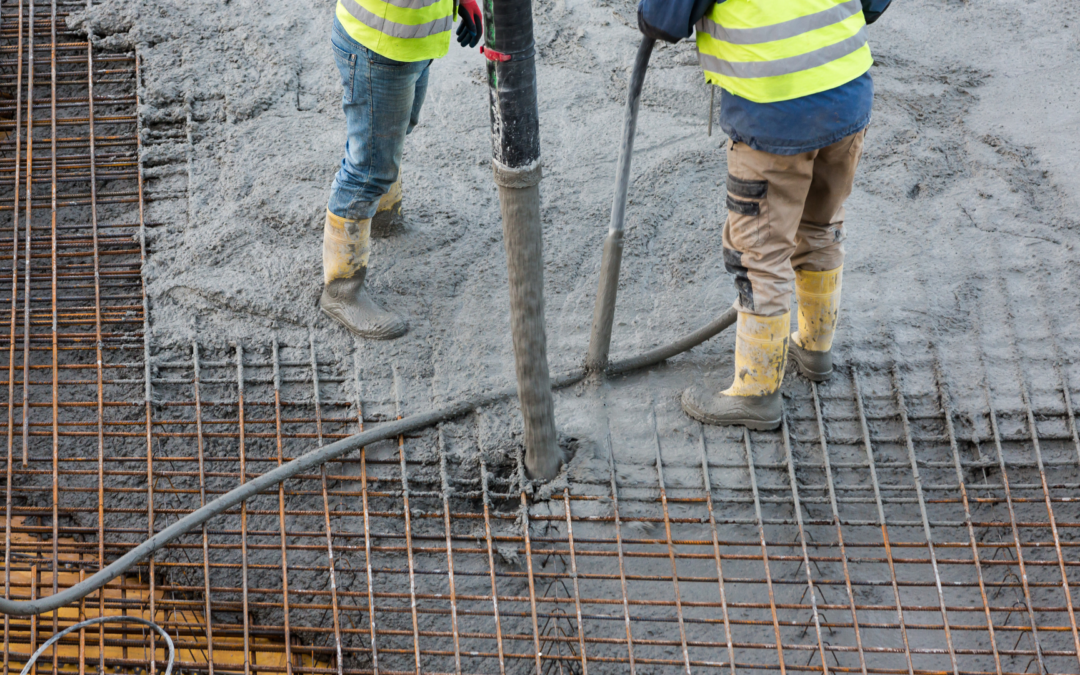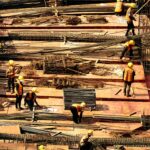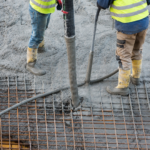When it comes to constructing or renovating commercial spaces, the quality and durability of concrete work are paramount. Whether it’s building a new office complex, a retail center, or an industrial warehouse, the expertise of commercial concrete contractors can make or break the project. These professionals not only ensure that the structures are built to last but also that they meet all necessary safety and regulatory standards. In this guide, we’ll explore what to look for in a commercial concrete contractor, the types of services BF they offer, and how to choose the right one for your needs.
What Do Commercial Concrete Contractors Do?
To fully understand the role of commercial concrete contractors, it’s essential to delve into the specific services they offer. These specialized professionals are responsible for a range of concrete-related tasks that are critical to the construction and maintenance of commercial properties.
Scope of Services
Commercial concrete contractors provide a variety of services tailored to the needs of business and industrial projects. Their expertise extends beyond basic concrete work to include more complex and specialized services. Here are some key services they provide:
- Concrete Pouring and Finishing: This includes laying concrete for foundations, floors, walls, and more. The finishing process ensures a smooth and even surface, which is essential for the durability and aesthetics of the project.
- Decorative Concrete: Contractors can add aesthetic features like stamped or colored concrete, which is particularly popular in commercial settings like shopping centers and office buildings. These enhancements not only improve the look but can also increase the property’s value.
- Concrete Repair and Maintenance: Over time, even the best-laid concrete can suffer from cracks, wear, and other damages. Contractors provide repair services to restore the integrity of the concrete and extend its lifespan. Regular maintenance is also crucial for preventing major issues.
- Structural Concrete: This involves constructing the core structural elements of buildings, such as beams, columns, and load-bearing walls. These elements are critical for the building’s stability and safety.
Importance of Expertise and Experience
Hiring an experienced contractor is crucial for ensuring the success of a commercial concrete project. The expertise and experience of a contractor play a pivotal role in delivering quality results. An experienced contractor ensures that the concrete work not only meets these standards but also stands the test of time. They bring knowledge of best practices, materials, and techniques, which is invaluable in avoiding costly mistakes and delays. Moreover, they can provide innovative solutions that enhance the functionality and aesthetics of the project.
Key Qualities to Look for in a Commercial Concrete Contractor
Selecting the right commercial concrete contractor is a critical step in any construction or renovation project. The choice of contractor can significantly influence the quality, cost, and timeline of the project. Here are some key qualities to consider.
Reputation and Reviews
A contractor’s reputation can provide valuable insights into the quality of their work and their reliability. Selecting the right contractor begins with a thorough assessment of their reputation and track record. This involves multiple steps:
- Online Reviews and Testimonials: Checking platforms like Google, Yelp, and the Better Business Bureau provides insight into past clients’ experiences. Look for patterns in the reviews, both positive and negative, to gauge overall satisfaction.
- Past Project Portfolio: Reviewing the contractor’s previous work helps assess the quality and scope of their experience. It’s beneficial to see projects similar to your own to ensure they have the relevant expertise.
- References: Speaking with past clients directly can provide a more detailed account of their experience, including how the contractor handled challenges and communicated throughout the project.
Licensing and Insurance
Ensuring that the contractor is properly licensed and insured is a non-negotiable aspect of the selection process. This not only guarantees quality work but also provides legal and financial protection in case of any accidents or issues. Licensing guarantees that the contractor has met the necessary industry standards and regulations. Insurance, on the other hand, protects you from potential liabilities should any accidents or damages occur during the project. It’s important to verify these credentials and ask for proof before proceeding with any agreements.
Professionalism and Communication
Effective communication and professionalism are key indicators of a reliable contractor. A good contractor maintains clear communication throughout the project, which is crucial for avoiding misunderstandings and ensuring that the project stays on track. Key aspects to consider include:
- Detailed Estimates: The contractor should provide a clear and detailed breakdown of costs and timelines. This transparency helps prevent unexpected expenses and delays.
- Regular Updates: The contractor should keep you informed about progress, any issues encountered, and how they plan to address them. This includes providing regular updates and being responsive to inquiries.
- Responsive Service: Prompt responses to inquiries and concerns are a sign of a contractor’s commitment to customer service. They should be easily accessible and willing to address any questions or issues that arise.
Understanding the Concrete Construction Process
Understanding the process involved in concrete construction can help clients better manage expectations and timelines. The construction process is a multi-phase journey that requires careful planning and execution. This process involves several key stages, each critical to the successful completion of a commercial concrete project.
Pre-Construction Planning
The planning phase is critical for the success of any commercial concrete project. Proper planning ensures that the project runs smoothly and stays within budget. This phase involves:
- Site Assessment: Contractors evaluate the site conditions, including soil quality and topography, to determine the best approach for the project. This assessment is crucial for identifying any potential challenges early on.
- Design and Engineering: Detailed plans are created, taking into account the structural requirements and aesthetic goals of the project. Engineering assessments ensure that the design will be safe and durable.
- Permits and Approvals: Securing the necessary permissions from local authorities is an essential step that ensures compliance with local regulations and building codes. Contractors often handle this aspect, streamlining the process for their clients.
Concrete Pouring and Finishing
Once the planning phase is complete, the project moves into the construction phase. The actual construction involves several key steps, each requiring precision and expertise:
- Formwork Installation: This involves setting up molds that will shape the concrete. Proper formwork is essential for ensuring that the concrete takes the desired shape and dimensions.
- Reinforcement: Steel bars or mesh are added to the concrete for added strength, especially in load-bearing elements. This reinforcement helps the structure withstand various stresses and loads.
- Pouring and Curing: The concrete is then poured into the formwork and allowed to cure. Curing is a critical process that involves maintaining the right moisture and temperature conditions to ensure the concrete reaches its maximum strength.
Post-Construction
The final phase of the project involves post-construction activities that are crucial for ensuring the long-term durability and appearance of the concrete work. Once the concrete is poured and cured, there are additional steps to ensure the project’s longevity:
- Finishing Touches: This can include applying sealants or coatings to protect the concrete from environmental factors and wear. Decorative finishes may also be applied at this stage.
- Quality Inspection: Contractors perform thorough inspections to check for any defects or issues. This ensures that the concrete work meets the specified standards and is ready for use.
- Maintenance Plans: Setting up regular maintenance schedules is crucial for prolonging the life of the concrete. This can involve periodic inspections, cleaning, and minor repairs to prevent larger issues.
Common Challenges in Commercial Concrete Projects
Despite careful planning and execution, commercial concrete projects can face several challenges. These challenges can impact the project timeline, budget, and overall quality of the work. It’s essential to be aware of these potential issues and plan accordingly.
Weather and Environmental Factors
Weather conditions can significantly impact concrete work. Contractors must be prepared to handle a variety of challenges, such as:
- Temperature Fluctuations: Extreme heat can cause the concrete to cure too quickly, leading to cracks, while cold temperatures can slow down the curing process. Contractors use special techniques and materials to manage these conditions.
- Rain and Moisture: Excess moisture can weaken the concrete mix, leading to durability issues. Proper planning and protective measures are necessary to ensure high-quality results.
Scheduling and Delays
Delays are a common challenge in commercial projects, often arising from unforeseen circumstances. Commercial projects often operate under tight deadlines, and delays can be costly. Common causes of delays include:
- Material Shortages: The availability of concrete and other materials can affect the project timeline. Contractors often plan for these contingencies by establishing reliable supplier relationships.
- Labor Issues: Inadequate staffing or skilled labor shortages can slow down the work. Contractors must manage their workforce efficiently and have contingency plans in place.
Budget Management
Managing the budget effectively is crucial to prevent cost overruns. Staying within budget is a common concern for any commercial project. It’s important to:
- Plan for Contingencies: Allocate extra funds for unexpected issues, such as unforeseen site conditions or material price fluctuations.
- Monitor Expenses: Regularly track costs to ensure they align with the budget. This includes being transparent with clients about any changes in costs or project scope.
Tips for Choosing the Right Commercial Concrete Contractor
Selecting the right contractor can be a daunting task, but it’s crucial for the success of your project. Here are some tips to help you make an informed decision.
Conduct Thorough Research
Choosing the right contractor requires careful research and consideration. Start by gathering information on potential contractors and their backgrounds:
- Verify Credentials: Ensure the contractor has the necessary licenses, insurance, and certifications. This not only guarantees quality work but also protects you legally.
- Review Experience: Look for contractors with experience in projects similar to yours. This ensures they have the relevant skills and knowledge to handle your specific needs.
Ask the Right Questions
Engaging with potential contractors and asking the right questions can help you gauge their suitability for your project:
- Project Timeline: Ask about the estimated timeline for completion and any potential factors that could cause delays.
- Cost Estimates: Get detailed estimates that include all aspects of the project, from materials to labor. This transparency helps you budget accurately.
- Problem-Solving: Inquire about how they handle unexpected challenges or issues that may arise during the project. This insight can be crucial for ensuring smooth project management.
Get Multiple Quotes
It’s advisable to obtain multiple quotes from different contractors. This not only helps you compare prices but also gives you a better understanding of what the market offers. Remember, the lowest quote isn’t always the best; consider the contractor’s reputation, experience, and proposed approach.
Conclusion
Choosing the right commercial concrete contractor is crucial for the success of your project. From initial planning to the finishing touches, every step requires skilled hands and expert oversight. A qualified contractor ensures that the project is completed on time, within budget, and to the highest standards of quality and safety.
For businesses in need of top-notch concrete services, Greensboro Concrete Services offers the experience and reliability you can trust. Our team of experts is committed to delivering eptional results, whether you’re undertaking a large-scale construction project or a smaller renovation. Contact Greensboro Concrete Services today to discuss your project and ensure a durable and professional finish for your commercial space.






